This year has been a tough one—between the ongoing coronavirus pandemic, the economic downturn, divisive political rhetoric, continued violence against Black people, and environmental disasters.
Maybe that’s why some of our favorite books of 2020 are books that gave us reason for hope. Evolutionary biologists, historians, and psychologists all shared their perspectives on human goodness this year, showing how we are surprisingly kind, moral, and friendly toward each other. We learned how altruism can be deliberately cultivated, and how the power of the collective can be harnessed to make positive change in society. That’s all good news.
But alongside hope we also need to take action. To that end, our favorite books focus on how to increase self-understanding and moral courage. If we want to strive for a better future together, free of racism, climate change, and harsh political divides, we need to increase our wisdom, understand our biases, and take better care of ourselves, so we have the energy to be the change agents we want to be.
So, if you’re looking for ways to enhance your well-being, stand up for what you believe in, embrace our common humanity, and find reason to hope for a better future, look no further than this collection of great books.
Black Fatigue: How Racism Erodes the Mind, Body, and Spirit, by Mary-Frances Winters
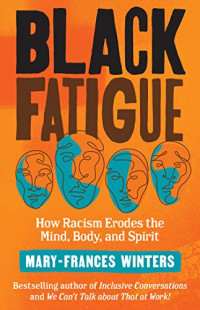 Berrett-Koehler Publishers, 2020, 256 pages. Read an essay adapted from Black Fatigue.
Berrett-Koehler Publishers, 2020, 256 pages. Read an essay adapted from Black Fatigue.
Amid the senseless killing of so many unarmed Black people, and the constant discrimination Black people face in everyday encounters, it’s not surprising that Black people are fatigued. Not only is experiencing racism exhausting, it worsens health, career opportunities, and overall well-being.
Diversity, equity, and inclusion expert Mary-Frances Winters has been working in organizations for decades, trying to uncover the racism Black people face on the job—from hiring to promotion to compensation inequities—and seeking ways to address it. While her book recounts the many ways discrimination continues to plague Black people, it also offers hope for the future.
Winters writes about how colleagues, leaders, and organizations can create a more supportive work environment for Black people. For example, it requires listening non-defensively to the Black experience in the workplace (and elsewhere) and enacting policies that have been shown to reduce discrimination. With the public paying more attention to racial inequities in the wake of an energized Black Lives Matter movement, Winters’s years of experience and wisdom could not be timelier.
Friendship: The Evolution, Biology, and Extraordinary Power of Life’s Fundamental Bond, by Lydia Denworth
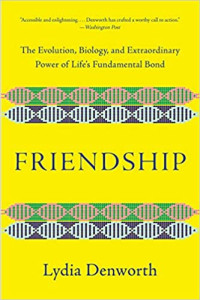 W. W. Norton, 2020, 320 pages. Read our Q&A with Lydia Denworth.
W. W. Norton, 2020, 320 pages. Read our Q&A with Lydia Denworth.
When life becomes hectic, it’s often our friendships that get sacrificed, taking a backseat to our family and work obligations—or our latest fling.
But that’s a mistake, argues journalist Lydia Denworth in her book Friendship. In fact, research suggests that friendships can help us find purpose and meaning, stay healthy, and live longer. The intimacy, support, equality, and emotional bonds we have in our friendships are unique.
“The science of friendship gives you permission to hang out with your friends and call it healthy,” she says. “You’re not being indulgent.”
Her book moves from online friending to macaque relationships on a Puerto Rican island to the brain areas underlying our social skills to provide a wide-ranging picture of the evolution and biology of friendship. What becomes clear is that friendships are not just fun or frivolous; they play a major part in human history, child development, and our health and well-being.
Although Denworth doesn’t offer many practical suggestions for cultivating friendships, her overall message is that we need to make time for the friends in our lives. And that’s a particularly relevant reminder in 2020, when so many of us are realizing just how hard it is to be separated from our friends.
Humankind: A Hopeful History, by Rutger Bregman
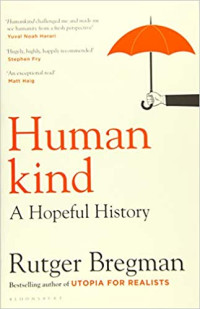 Little, Brown and Company, 2020, 480 pages. Read our review of Humankind.
Little, Brown and Company, 2020, 480 pages. Read our review of Humankind.
Many of us have a dim view of humanity. We believe people are selfish and cruel at heart and that only strict social control keeps their evil natures in check.
But, according to historian Rutger Bregman, that view is dead wrong. Instead, we were born to be kind, generous, and cooperative, and we need to understand that truth to create a society that nurtures our better instincts.
Bregman sifts through historical accounts, anthropological findings, and scientific evidence to show that when people are under duress or given opportunities to be selfish, they usually act with kindness instead. He counters old narratives that might make us think otherwise, including the story of Kitty Genovese’s murder in Queens, where bystanders supposedly did nothing, and the outcome of the infamous Stanford Prison Experiment, where participants seemed to turn sadistic. In both cases, says Bregman, flawed analyses of what actually happened led to misunderstandings of human nature that are still, unfortunately, perpetuated today.
His book is not only provocative, it’s entertaining, too. And its inspiring message resonates: “To believe that people are hardwired to be kind isn’t sentimental or naïve. On the contrary, it’s courageous and realistic,” he writes. If we take that to heart, we can all learn to trust each other a bit more and design institutions that bring out the best in everyone.
Neurodharma: New Science, Ancient Wisdom, and Seven Practices of the Highest Happiness, by Rick Hanson
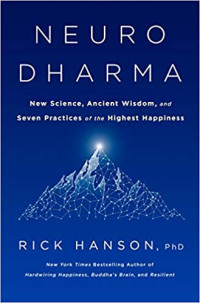 Harmony, 2020, 352 pages. Read our Q&A with Rick Hanson.
Harmony, 2020, 352 pages. Read our Q&A with Rick Hanson.
Given how much stress and trauma we’ve faced this past year, we all could use some lessons in resilience. In his book, psychologist and meditation teacher Rick Hanson explains how to become more resilient by cultivating positive states of being that will serve us not just now, but long into the future.
Hanson identifies seven key qualities that produce our highest happiness and well-being: a steady mind, a warm heart, equanimity, self-acceptance, being present, feelings of connection to the greater universe, and a sense of timelessness. With evidence from neuroscience research, he claims that anyone can potentially get in touch with these states through meditation and other practices. By understanding our neural circuitry, he says, we can deepen these experiences—and possibly increase our motivation to practice in the first place.
Personal transformation is central to societal transformation, argues Hanson. So, while his book is focused on how to “grow the good” in ourselves, it’s also about trying to develop our capacity for moral action. By recognizing our inner longing for peace and love and working to attain these higher states of being, we won’t just feel better; we’ll be better equipped to change the world.
Perception: How Our Bodies Shape Our Minds, by Dennis Proffitt and Drake Baer
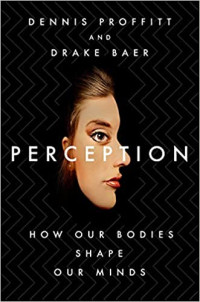 St. Martin's Press, 2020, 304 pages. Read our review of Perception.
St. Martin's Press, 2020, 304 pages. Read our review of Perception.
How we perceive our world is dependent in part on how our bodies need to interact with our environment—a phenomenon called “embodied cognition.” Researcher Dennis Proffitt and journalist Drake Baer highlight the fascinating research on embodied cognition, helping us to understand why different people don’t always see things the same way.
We may think we perceive the world “as it is,” but we don’t, they write. Our physical abilities, emotions, prior beliefs, and social connections all impact our perceptions. For example, studies have found that if we are tired or out of shape, hills look steeper to us. We have trouble solving simple mathematical problems when the answer refutes our prior beliefs. We also tend to give more credence to statements that rhyme, and the presence of other people can make tasks seem easier or pain less difficult to bear.
While these might just seem like fun facts, they are relevant to our interactions with others: “If we are going to have a better understanding of ourselves and our fellow human beings, we need to appreciate the startling individuality of everyone’s experience,” write the authors. Their book suggests we could all use more humility rather than assuming our own perceptions of the world are right.
Successful Aging: A Neuroscientist Explores the Power and Potential of Our Lives, by Daniel Levitin
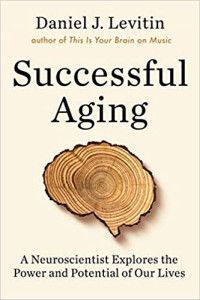 Dutton, 2020, 528 pages. Read our Q&A with Daniel Levitin.
Dutton, 2020, 528 pages. Read our Q&A with Daniel Levitin.
All of us want to avoid the potential pitfalls of aging, like dementia, loneliness, or fragility. But what can we do to keep ourselves cognitively fit, happier, and healthier as we age?
Neuroscientist Daniel Levitin outlines the latest research on how people’s brains change with age and finds reason to be optimistic. Our brains are more capable of elasticity than we previously thought, and, counter to common belief, many older people have special cognitive abilities that help them thrive as they age.
Levitin reveals how our personalities, social lives, and physical bodies all intersect with our brains to make them more resilient. And he gives several tips for how to age well, including being open to new experiences, getting regular exercise (hiking is a good one for a better brain workout), eating healthy food, and nurturing our social relationships. More importantly, he calls for society to stop treating aging as something problematic and to embrace the unique strengths of older people.
The Kindness of Strangers: How a Selfish Ape Invented a New Moral Code, by Michael McCullough
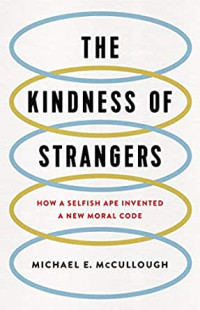 Basic Books, 2020, 368 pages.
Basic Books, 2020, 368 pages.
Why we care about strangers and go out of our way to help them is still a mystery to many scientists. After all, putting ourselves at risk for non-family members can make passing on our genes less likely—which seems contrary to the theory of evolution.
But, according to psychologist Michael McCullough, our altruistic moral code isn’t simply a product of slow-moving evolution. Instead, he argues, it has developed by leaps of thought and reason that occurred during particular points in history—such as the Golden Rule (embraced in the late B.C. era), the Enlightenment ideals of 17th and 18th century Europe, and the more recent “effective altruism” movement.
Though humans may have originally acted with kindness in order to benefit themselves—to receive kindness back or to increase their status in society—they later recognized that society benefits when everyone is cared for equally, and they felt morally compelled to help those in need.
Rather than relying on altruistic instincts alone, McCullough argues that we should deliberately cultivate kindness and compassion. “Compassion can bring us gratitude and glory, it can protect us from the side effects of poverty and desperation, it can grow the economy rather than shrink it, it can help people take responsibility for their own lives, it can bring deep meaning and fulfillment, and—to anyone who views suffering as the focus of moral concern—it is a duty,” he writes.
The Upswing: How America Came Together a Century Ago and How We Can Do It Again, by Robert Putnam and Shaylyn Romney Garrett
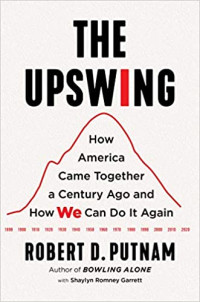 Simon & Schuster, 2020, 480 pages. Read our Q&A with Robert Putnam and Shaylyn Romney Garrett.
Simon & Schuster, 2020, 480 pages. Read our Q&A with Robert Putnam and Shaylyn Romney Garrett.
Many of us wonder how the United States will ever get through our current social, economic, and political strife.
But, if we look to the Gilded Age of the early 20th century, write political scientist Robert Putnam and social entrepreneur Shaylyn Romney-Garrett, we see that the country faced similar conflicts and yet came through better off. How that happened (and why) is the subject of their book.
According to the authors, America experienced an “upswing” that came about because of a determined coalition of Progressive Era activists (not to be confused with today’s political “progressives”). The activists’ persistence, vision, and “we’re in it together” messaging ushered in a golden era of social policy changes—first at the local, then national level—that helped reduce inequality, social isolation, and political strife, while increasing social cohesion, innovation, and prosperity (although progress for groups like women and Black Americans wasn’t as consistent).
Unfortunately, write the authors, this upswing reversed itself around the mid-1960s, so that we find ourselves today in circumstances similar to those of the Gilded Age.
By understanding history, say the authors, Americans can come together to find common cause and push for change, while being inclusive of all people. In that way, we have a better chance of recreating the upswing of yesteryear.
Time Smart: How to Reclaim Your Time and Live a Happier Life, by Ashley Whillans
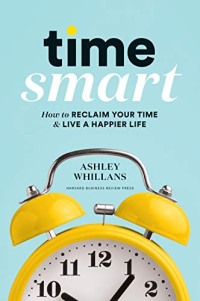 Harvard Business Review Press, 2020, 185 pages. Read our review of Time Smart.
Harvard Business Review Press, 2020, 185 pages. Read our review of Time Smart.
There’s an old adage, “Time is money.” It implies that being idle is a waste of time and will lead to less success in life.
But researcher Ashley Whillans argues that this is wrong-headed. By explaining the research on money, time, and well-being, she makes a strong case that we’d be happier, more socially connected, and more satisfied with our work if we valued our time more, valued wealth less, and kept our need for free time in mind when making everyday decisions about our lives.
Whillans alerts us to the many “time traps” that we get caught up in that keep us from being happy, including overusing technology, overcommitting at work, or being unable to tolerate boredom. She also provides practical advice on how to make decisions in a more “time-smart” way, suggesting that bargain-hunting or buying a house far from your workplace may not be worth the time lost in searching for the best price or commuting. And she points to ways of feeling like you have more time, such as taking a technology break or doing an awe walk—both of which can make you happier.
Although her tips may not be accessible to all readers, her overall message is thought-provoking. As Whillans writes, “By focusing on time, you can contribute to the happiness of family, friends, coworkers, your community, and the planet.”
Together: The Healing Power of Human Connection in a Sometimes Lonely World, by Vivek Murthy
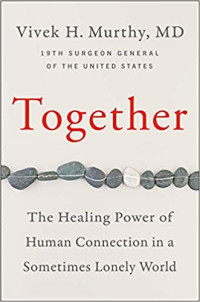 Harper Wave, 2020, 352 pages. Read our Q&A with Vivek Murthy.
Harper Wave, 2020, 352 pages. Read our Q&A with Vivek Murthy.
In his book, former (and newly appointed) U.S. Surgeon General Vivek Murthy doesn’t weigh in on the coronavirus pandemic, but on the pandemic of loneliness experienced by millions around the world. Too many people live their lives in unwanted isolation, he argues, which hurts their health and happiness in profound ways.
As a physician, he’s witnessed firsthand how loneliness affects people’s quality of life, especially as they age. But he digs deep into the research to show us how much loneliness costs society, too. When we leave people to fend for themselves, they are less productive and less civically engaged, and they are more apt to stress the health care system, which hurts us all.
To combat loneliness, we need to nurture three types of social connection: intimate relationships, friendships, and belonging within a larger community. Even as we fight off loneliness, he explains, we can still embrace solitude—a more positive state, where we can take time to reflect on and appreciate our lives. His book calls upon us all to do what we can to put our relationships first and to create institutions that support social connection. In that way, we’ll all be happier and healthier.
Transcend: The New Science of Self-Actualization, by Scott Barry Kaufman
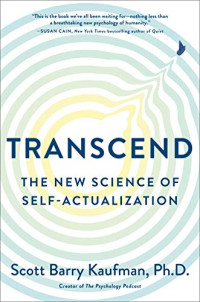 TarcherPerigee, 2020, 432 pages.
TarcherPerigee, 2020, 432 pages.
You’ve probably heard of Abraham Maslow’s “hierarchy of needs”: shelter, food, clothing, safety, belonging, respect, freedom, and—at the very top—self-actualization. In his book Transcend, psychologist Scott Barry Kaufman revisits Maslow’s pyramid. He breaks down some of the cliched ways we think of Maslow’s work as a step-by-step guide, clarifying that Maslow saw the human journey as a good deal more messy and complicated than the pyramid metaphor suggests. Kaufman also brings Maslow’s ideas up to date with the research that has been conducted after his death, sifting through the evidence that might support or revise his ideas. At the root of Transcend is an intellectual question: What do the humanistic psychologists of a century ago have to teach us today?
“Too many people today are feeling deeply unfulfilled in our chaotic and divided world, which encourages the pursuit of money, power, greatness, even happiness, as the pinnacles of humanity,” writes Kaufman. “The social psychologist and humanistic philosopher Erich Fromm was quite right that there is an art of being. But now there is also a science of being.”
Why We Act: Turning Bystanders into Moral Rebels, by Catherine Sanderson
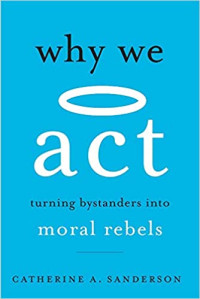 Belknap Press, 2020, 272 pages. Read an essay adapted from Why We Act.
Belknap Press, 2020, 272 pages. Read an essay adapted from Why We Act.
Sometimes we humans don’t stand up for our beliefs. We let racist comments go unchallenged, or we turn the other way when we see someone being bullied. Why?
As social psychologist Catherine Sanderson explains, it’s often hard to challenge bad behavior in the moment. Sometimes situations are ambiguous, and we don’t want to take a big social risk or call someone out on their behavior without being sure of their intentions. Sometimes we fear the consequences of potential social rejection, career setbacks, or even violence, especially when questioning the behavior of someone in power.
Yet it’s so important to take a stand, because it’s one of the most effective ways of stopping bad behavior in its tracks. Think of how many fewer women would have suffered abuse from Harvey Weinstein or Bill O’Reilly if someone had spoken up sooner?
We cannot expect victims to defend themselves alone; we all need to strengthen our inner “moral rebel” if we are to end sexism, racism, homophobia, and more. Luckily, Sanderson gives us plenty of ideas on how to increase our chances of responding, based on the social science research. With practice and the support of like-minded others, we can all be better at confronting bad behavior when we see it.


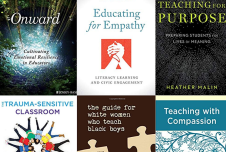
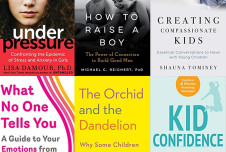
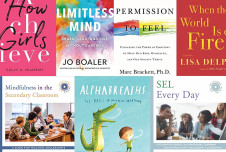
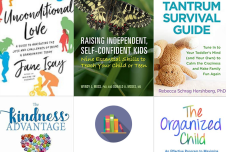
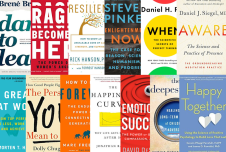
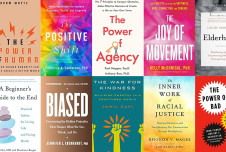
Comments